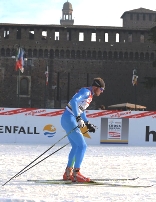A Professor Welcomes Cross-Country Ski Champions
A piece of Bocconi was at a major sporting event over the weekend of 14-15 January. Maurizio Dallocchio, Full Professor and holder of the Nomura Chair of Corporate Finance, held the role of Chairman of the Organizing Committee for the Milan stop on the world circuit of cross-country skiing, at the beautiful location of Parco Sempione.
"It was a truly complex task," explains Dallocchio, visibly elated after witnessing the event draw over 20,000 spectators during both days of the competition, Saturday and Sunday 14-15 January. "I made use of the skills from people in the sector, such as Guido Mapelli, organizer of cross-country events, and Maurizio Gandolfi, former organizer of the Alpine Skiing World Cup and competitions for the World Cup in Bormio."Setting up a cross-country skiing competition in a city is not an easy thing to do, and it means dealing with a series of various and complex problems. The only certainty, at the starting time, was the location. "We decided early on about Parco Sempione, an ideal place because of its beauty and accessibility," continues Dallocchio. He is a sportsman who has participated in 15 New York marathons and has a passion for winter sports. "There were good intentions, because the event we had in mind needed to stand up from an economic point of view and it also needed to be sustainable from an environmental point of view. There was also respect for diversity, as the organization hosted a paralympic competition after the World Cup competitions."
 |
The objectives were reached, with constant work and commitment from many sides, including logistics, institutional relations and sporting policy with the various national federations: "First of all, it was about hosting around 250 people in Milan, including athletes and technical officials from 15 countries. So, providing transfers, hosting, the organization of various areas for materials, side activities and all the organizational aspects to make the competition perfect. Then there was the preparation of the track, with snow that was half artificial and half natural taken from a snowslide in Bergamo. This had to be prepared while being careful not to damage such a valuable asset for the Milanese population as Parco Sempione. Over 200 volunteers worked on the initiative."Dallocchio, who already had experience with the organizing committee at the Alpine World Ski Championships 2005 in Valtellina, found another bump in the road when dealing with institutions, "and I received excellent collaboration from the Region of Lombardy, and the Province and City of Milan," he says, "with the slight complication that in Milan we began work by talking with the Moratti city council and continued with the council headed by Mayor Pisapia. But alderwoman Chiara Bisconti showed a lot of interest and promised to keep the track active during the week after the competition, with the involvement of schools and technical officials." The event required commitment and sacrifices but it was considered a complete success by everyone involved, including athletes, the press and the federation. And it caused a wave of congratulatory emails to clog up the professor's inbox: "A lot of former students from all over the world wrote me to let me know how Milan's image has been improved by the initiative. It's not easy to organize international sporting events in our city." Dallocchio continued, "Jürg Capol himself, the director of cross-country skiing at the International Federation, told us he had never seen a city competition organized this well and with such a large audience." There would be many requirements for the Milan leg to have a sequel. "Bringing the best athletes in the world to compete with the picturesque background of Castello Sforzesco is a challenge we would take on again with pleasure," says Dallocchio. "But it's too soon to commit. The response from the audience certainly testifies that Milan wants to host large events and this was an key drive for us."